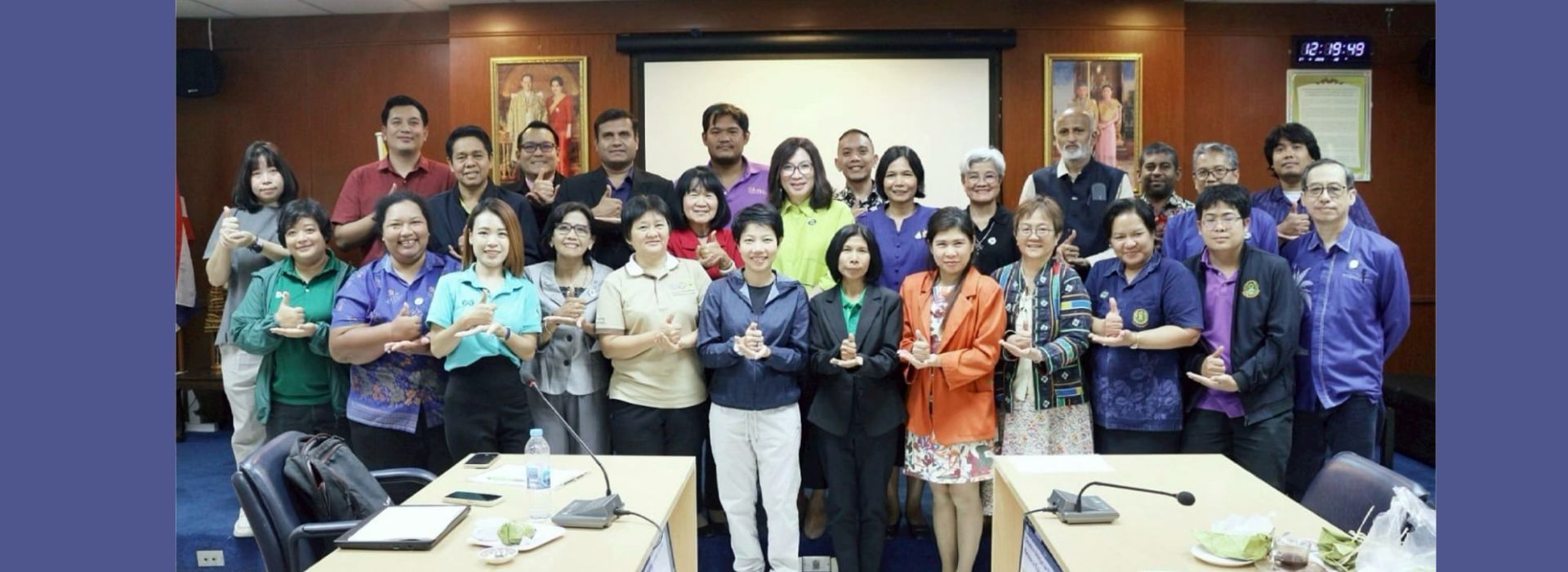A consultative meeting was convened by ICC and the Department of Agriculture (DOA) in Thailand from April 26th-27th, 2025, to address the pressing issue of low-yielding aromatic coconut plantations in the region. The gathering brought together international experts, DOA officers, and representatives from the ICC to analyze the problems and explore potential solutions. The initiative for the meeting was driven by the Horticulture Research Institute (HRI), under the DOA, which sought assistance from the ICC to tackle the challenges affecting aromatic coconut production. Dr.Wilaiwan Twishsri, Director of the Academic Division at HRI and the meeting's coordinator, emphasized the need for recommendations to improve yield and mitigate the adverse effects of climate change on these plantations.
The schedule outlined a series of activities commencing on April 26th , including a field visit to aromatic coconut farms in Ratchaburi province. This visit allowed the experts from ICC and DOA/HRI officers to conduct site assessments, interact directly with farmers and entrepreneurs, and gain firsthand insights into the specific challenges faced in the area. The first visit was to Koh San Phra Subdistrict, Wat Phleng District, Ratchaburi Province. The following next visit was to the Royal Thai Aromatic Coconut Co., Ltd., Bang Phae Subdistrict, Bang Phae District. And, the last visit was to Royal Company, aromatic coconut plantation, and K-fresh Co., Ltd, located in the same province.
The consultative meeting was held at the HRI building on April 27th. The day's agenda was packed with presentations, discussions, and recommendation sessions. Ms. Kanjana Thongna Director, Horticulture Research Institute, DOA, Ministry of Agriculture and Cooperatives, ANLO of ICC, initiated the meeting with welcome remarks and an outline of the meeting's objectives. She also introduced the role of the Horticultural Research Institute (HRI) in Thailand, emphasizing its mission to enhance horticulture, develop production technologies, and transfer knowledge. The institute, under the Ministry of Agriculture, includes 10 research centers across Thailand, focusing on crops like coconut, mango, and herbs. observations and field visits were crucial for formulating preliminary recommendations.

The meeting expressed appreciation for the ICC’s support to the Government of Thailand and the Horticulture Research Institute. It highlighted the need to protect Thailand's special aromatic coconut varieties, which are treasured around the world.
Following this, Dr. Jelfina C. Alouw, Director General, ICC, provided further remarks, in which she acknowledged experts from the Philippines, India, and Sri Lanka for their technical assistance and leadership in coconut sector development. She mentioned that the meeting aimed to identify key causes of low productivity in Chachoengsao and Chonburi provinces. The first session was dedicated to presentations by the expert panel, focusing on their findings from the field visits and their expert analysis of the situation. The panel comprised of Dr. K. Balachandra Hebbar, Director, Central Plantation Crop Research Institute (CPCRI), India; Dr. Anjana Atapattu, Head, Agronomy Division, Coconut Research Institute (CRI), Sri Lanka; and Prof. Dr. Celia Medina, Director, College of Agriculture and Food Sciences, University of the Philippines, Los Baños. These experts shared their knowledge and observations with the attendees, which included several officers from DOA.
The experts reported that observations from field visits and discussions with farmers, reveal that coconut growth and low productivity of the aromatic varieties are increasingly affected by climate change-induced factors such as high temperatures, low RH, water deficits, and prolonged dry weather. Farmers reported reduced flowering, poor nut set, smaller nut size and poor nut quality leading to significant yield losses in several coconut plantations. However as of now incidence of pests and diseases is minimal.
An open discussion and a Q&A segment also facilitated, encouraging interaction between the expert panel, DOA, and ICC representatives. This platform allowed for a deeper exploration of the issues and collaborative brainstorming of potential solutions.

The meeting concluded with a session focused on formulating conclusions and recommendations. Recommendations for climate resilience in coconut production by experts include soil and plant-based nutrient management, plant tissue analysis, enhancing soil moisture retention and nutrient use efficiency, water management, good spacing for optimal growth, and several research theme to be conducted for strengthening adaptation strategies and inform breeding and management practices.
This crucial session was chaired by Dr. Hebbar K. Balachandra, ensuring expert guidance in synthesizing the findings and proposing actionable strategies. The consultative meeting officially closed with remarks from Mrs.Wilaiwan Twishiri, Director of the Academic Division at HRI. Mrs. Wilaiwan Twishsri conveyed HRI's gratitude to the ICC for sponsoring the participation of the three technical experts.
The consultative meeting represents a significant step towards addressing the challenges faced by Thailand's aromatic coconut plantations. By bringing together international expertise and local knowledge, the DOA and HRI aim to revitalize this important agricultural sector and ensure its sustainability in the face of evolving environmental conditions.

